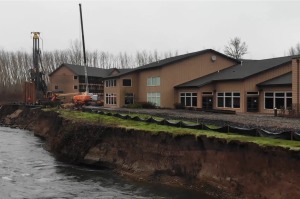Interview: Luis Palau on 50-Year Ministry Run
Days before hitting the grounds of San Diego, Calif., for his signature evangelistic festival, Luis Palau spoke to The Christian Post reflecting back on 50 years of ministry. Palau has shared the Gospel in person to 25 million people in 72 countries with more than 1 million registered decisions for Jesus Christ.
CP: I see that you just celebrated 50 years of ministry.
Palau: It's quite frightening isn't it?
CP: Looking back, do you feel it was easier or more difficult than what you expected when you started your evangelistic journey 50 years ago?
Palau: In many ways it was more difficult then because there were very few Bible-believing Christians in our part of the world in South America. The numbers were so small, the influence so minimal and the masses and the people that were in power sort of look down on those who are simple believers in Jesus Christ. Nowadays, things have changed in all of the world really. The last 60 years or so when you analyze church history things have changed in a tremendous way for the better. Even though things are not easy – there are some parts of the world where there's persecution, a few places where there's actual violence against believers; that has always been true since the day they crucified Jesus Christ. But in a way it has more open doors and a little more freedom and opportunity than ever before. I think this is a better time in one way of looking at it to be alive and serve the Lord, I really do.
CP: What do you feel was your biggest obstacle?
Palau: It changed in the years. In the early years it was just the resistance, outright opposition, sometimes threats that came from just the masses of the people in the Spanish world where I started. Then as the years have gone by, there was a period there where atheism strongly promoted by the Marxist, Leninist currents of the world really resisted and pretty much almost stopped the proclamation of the Gospel except for people you know quietly passing out Bibles or Christian literature and sometimes short-wave radio in those days which was about the only way to penetrate these so-called barrier that used to be put there.
Now, I would say, besides certain parts of the world that you and I know about, the main resistance comes in Protestant countries where it seems like the established churches have lost the fire for those who do not have eternal life and the need for people to find peace with God. And there's a certain current right now it seems to me in certain circles to say the proclamation of the Gospel, yes it's important, but the real thing is social action and helping people materially, educationally and medically and so on, all of which is absolutely necessary and the church has done for hundreds of years – it's nothing just discovered recently. But I am a little concerned, I must admit, that may be changing but for the moment there's still a trend to say "look, yes, talking about Jesus Christ is a great, amazing thing. However, the real thing is helping people with their material needs." I think that imbalance is dangerous. So that's the way it's developed through the last 50 years or so.
CP: When you say resistance from Protestant countries, are you talking about them protesting against holding evangelistic events?
Palau: Evangelistic events definitely are resisted and have been for decades. I remember when Billy Graham was starting out, I was present at a conference he gave in London. And somebody said well, mass evangelism doesn't work. And he threw his head back and laughed and said that's been said since the beginning of history that it doesn't work. The proclamation of the Gospel works. It's not the method that works, but the proclamation and the more we preach the more the Gospel spreads.
But also there's resistance just plain on a philosophical basis and I fear that in many Protestant circles, it's a lack of personal experience with Christ that makes people be uninterested frankly, and there's sort of a questioning whether the exclusivity of Jesus Christ – the way, the truth and the life – is intellectually resisted. So I think that's what goes on. In long term, dead Protestantism, I would put it that way. On the other hand, there's always pockets of usually younger people who come alive to god, who are fired up, and you can see those pockets all over Europe, and the USA and Canada, Australia, New Zealand and so on. You see pockets like that of people coming alive in the Roman Catholic communion also. So God is always at work.
CP: Even with this "dead Protestantism," you also said it is a better time to be a Christian. Is it because you're hopeful of the younger generation?
Palau: Absolutely, yes. I think the younger generation is coming up all enthused about Scripture, about the resurrected Jesus Christ and about the reality of the Christian way of life. The quality of life that Jesus Christ gives is so superlative and so beautiful that I think the younger generation is embracing it enthusiastically. You find churches that are being led by sometimes older people allowing the younger generation to really lead the way in music, in dress styles, in enthusiasm, just being themselves and you see hundreds coming to Christ. I myself in the last few weeks I've been at massive churches in America.
One weekend up in Illinois, three hundred and fifty something people come to Christ first time. And then I was in California this past week and against three hundred and who knows people converted to Christ. You probably read the statistic but there's this study that's been made that 85 percent of Americans would positively consider an invitation to a Christian event. But only 2 percent of Christians actually ever invite a non-Christian to a Christian event. I believe that statistic is pretty close to realistic. So I think we need to encourage the youth in your publication.
CP: You've been ministering to teens and young adults for decades now. So you've seen what they are like. There have been studies on youth falling away and showing that their faith isn't deep, that they believe God just wants them to be happy and be nice to other people. What are your thoughts on those studies?
Palau: Well, I'm beginning, thankfully, to see some serious people questioning those studies and really coming out swinging against them. I think that it's been overstated, in my opinion. I don't know how these studies are made. But just walking around, yes, too many do drop out. I don't believe it's as many as claimed and also as I look at it I've come to the conclusion that those who do drop out, drop out because they were not converted to Jesus Christ from the heart.
The idea that the church doesn't actually prepare them to face the … public universities to me is a straw man as they say because if you really know Jesus Christ, you don't throw him overboard, or as they say under the bus, just because some professor questions creation or evolution is promote or some story of the crusades in the middle ages and that totally destroys the faith of young people. If you really know Jesus Christ you may be startled by some attack from a professor, but you don't just easily just give up on the faith. I am convinced that what we need to do is see the young people in our churches truly confronted by the claims of conversion, repentance and faith.
And on the other hand you see so many young people, I see it in our families, I see it in our church, who really are devoted to Christ, who are searching about missionary work, who are studying the Bible, who really get excited about holiness – that gives me great hope. Long answer, but I would say conversion is what's missing and we need to emphasize it. I'm doing it more and more. I'm accepting invitations to local churches in between the big festivals. I just want to speak to their heart and say have you been converted. Have you got a new heart? Has the heart of stone been removed and have you got the Holy Spirit in you? That's what I'm pushing very heavily. And I think if there is, and there is no doubt a leakage, it's that the non-conversion of too many of our young people who we think that by osmosis, they can observe Christianity. That's not the way it works, does it? it's got to be a conversion from the heart. So I think that the stats are overblown.
CP: Regarding the conversion issue, do you feel that may be a failure in the church?
Palau: Yes, I think there are many young people in the church who because we are not clear. I was brought up in the church as a boy and you feel it's part of your life, you know? Until somebody wakes you up and asks you pointedly, if you die today are you going to heaven or hell? That wakes you up and makes you think wait a minute now. That was done to me when I was 12 years old. And I was totally enamored of Jesus Christ, the Gospel, church, singing, prayers, all that. But that startling question woke me up as a 12-year-old. And I said no, I'm going to hell. And the counselor led me to Christ. And I think we really need that clear confrontation, we parents and grandparents we must not be coddling the young people, saying he's a fine fellow, he's a nice boy. He may be nice but one day he's going to behave unnicely and we've got to see them confronted by the reality of death and life, of eternity and so on.
CP: Are you worried about the direction that America is headed in terms of a drift away from God?
Palau: Absolutely I am. I am because in our effort, and I include myself in this, in our effort to please society, in our effort to win the good will of governments and the industry and the media and academia, we run the risk of going over the line, in being nice people that everybody applauds and you get good write-ups in the paper – which I get and I'm grateful for. Nevertheless, I am concerned. I am concerned about the fact of how the culture is moving. There are wonderful signs of good happening,
countercultural, Christians really standing up and living holy lives. But when you look at the mass media and how it promotes a loose lifestyle … I mean we talk about degrading women but they degrade themselves on television and on shows. We talk about being a city on a hill that gives light to the world and look at what happened on Wall Street and the shameless greed and the carelessness to our widows and orphans, the sins of being unjust to them.
So I am concerned about the USA and yet at the same time extremely hopeful. So it's a double barrel shotgun that I'm pointing here. On the one hand the concern is real. There are certain attacks on believers and it's subtle; it pretends to be intellectual, it's mostly snobbish and so on. And the relentless mocking of people who believe. But on the other hand, thank God that … you see a great countercurrent happening at the same time. Which one wins will be the question.
CP: What are your thoughts on the recent debate over the mosque near ground zero in New York City and what seems to be increasing anti-Muslim attitudes?
Palau: I'd rather not get into that. If you say it too quickly, you may appear to be imbalanced or prejudiced. It would seem to me that the people of New York have to resolve that themselves. It does seem insensitive when there's such a reaction.
CP: After 50 years of ministry, you're heading into the San Diego festival this weekend, has your approach to evangelism changed?
Palau: Yes. Well, you know San Diego is a unique city. We are praying extremely much for it. There has been a great sense of growing unity among the churches. San Diego county, the percentages are very interesting. Hispanics are very high in percentage, not the highest – it's still Anglo Saxon – but Hispanics, Asians have grown tremendously here and the need to reach out to the community, we need lots of prayer. The city is a city that has sunshine, lots of fun, it's military also, of course navy and the marines; it's a very interesting county. We're trying to reach out to the young people.
School has started so therefore we think it's easier for the Christian young people to connect with a non-Christian friend and try and bring them out. So we're focusing on youth again with the music – Kirk Franklin and all the others – and then in Spanish we're reaching out to the Hispanics. We've been going here now for about a year and a half. There's been great work in what we call the season of service which is the very thing that I told you we're concerned about. They penetrated hundreds of projects. 40,000 volunteers from the churches serving the city and the government is very pleased and the business community very thankful. Yes, we've penetrated I think the community. There's always much more to go. But we hope to leave a good seed behind.
CP: But your method and message overall is pretty much the same?
Palau: Pretty much the same, yes, but we're beginning to analyze what to do in the next 10 years. We've been at it for 11 years with the festival model where we do season of service, opening up people's lives and blessing them, and preparing them for the service of the Lord Jesus Christ on the cross and his resurrection. Now we want to reevaluate after 10 years what does the next decade hold, society changes and young people's ways, tastes and emphases change. That's what we're looking at here in San Diego and watching it carefully. The next one in America will be Phoenix in late winter. We're looking at it to see what in America seems to be the channel to draw young people to Christ and adults too.
CP: We keep hearing out pastors burning out. what is it that gives you strength and inspiration to keep going?
Palau: I have noticed it myself. In fact I'm giving a lot of time, I must admit to you, to helping pastors. There is a burning out. I'm not sure exactly what the cause is in people whether … with some of the smaller churches, often they have very little help in terms of income and personnel. The larger churches I think stretch themselves, they work so hard, and they seem to be burnt out. but you know burning out can happen to anyone.
I'm rejoicing over 50 years and when the celebration took place, I couldn't believe it was about me. I mean 50 years sounds like a long time. I say there's no secret, to be honest. It's all out in the open. It's a daily walk with Jesus Christ. C.S. Lewis called it the same old thing. We are so used to new, new, new that we think there must be a new approach. Not really. It's a relationship with Jesus everyday, listening to his voice, taking lots of time with Him rather than less. The shouting from the computers and the television and the internet just absorbs your time. I just got for my 50th an iPad. That's absorbing my time. I got to shut it down and spend time with the Lord. It's just daily prayer, worship, listening to His voice, obedience – that's it. Love Him and love your neighbor. There really is no other secret. I get asked that quite a bit. We just have to carve out time alone with the lord. That's something that's not easy to do, family demands, business, work, the economy. But man, if we don't give an hour minimum to the Lord a day, and it can be carved out if you're serious, you're really going to run out of gas, so to speak.
CP: Last question, what has been your biggest joy?
Palau: I'll give you three or four. I think to see my wife and our sons and their wives walking with God and serving Jesus Christ with all their hearts has to be very close to the top. Together with that of course, to see multitudes and multitudes still come together to hear the good news of Jesus. That gives me great joy. The Lord called me when I was a teenager, or at least I sensed the impulse to evangelize cities, and he has graciously allowed us to do that. That is a great joy especially when a city can truly be said that they heard the voice of God.
We have this model, it's internal but we sometimes use it externally, inside the team, let all San Diego hear the voice of God, or let all of London. … Our goal is to shake the city, speak to the city, bless the city with the good news of Jesus. I can look at those maps they have (in airplanes) and … all the cities we've been allowed to preach [in], you just rejoice. You've been able to …. lift Him up. He said if I be lifted up, I will bring all men to myself. That's our dream. I got to give you another one. Having lived this long, we're getting now because of e-mails, so many people who were converted 30, 40, 45 years ago and now they're in the ministry, happily married. Yesterday, I got a poem from a young guy who was converted in Venezuela … I can't even remember being in that city.



























